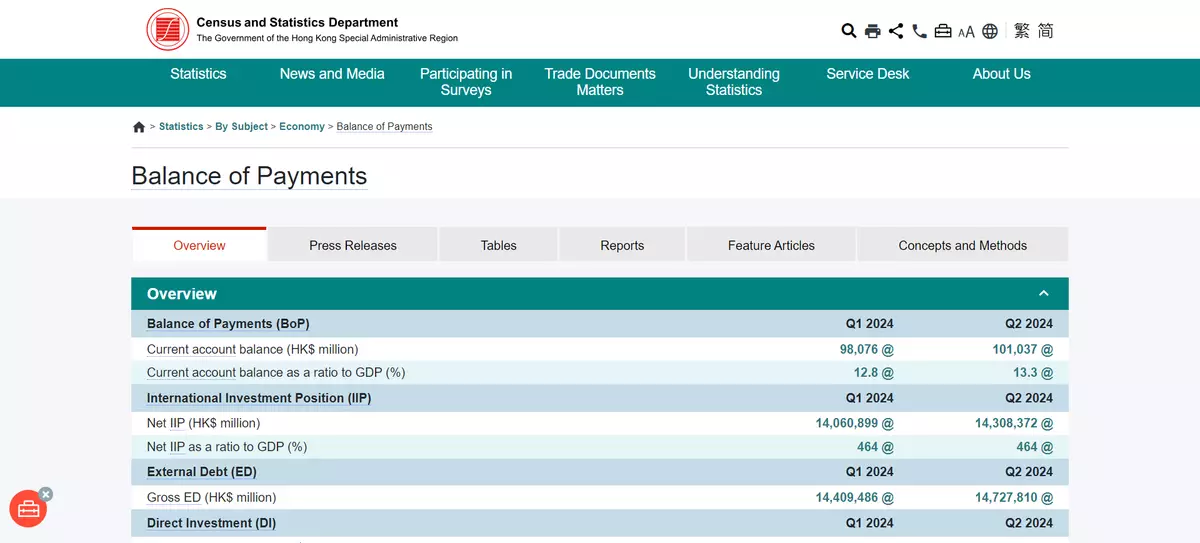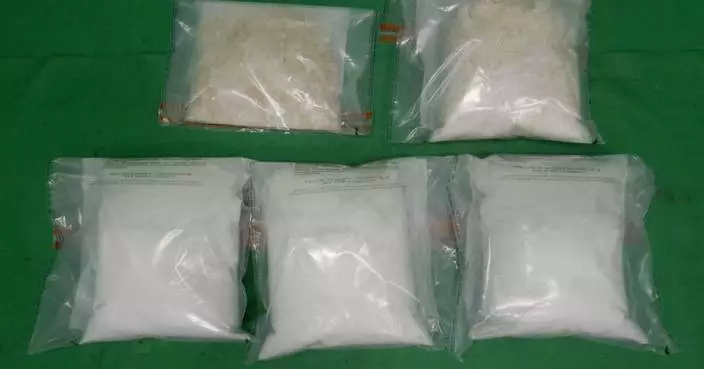Hong Kong's Balance of Payments and International Investment Position statistics for second quarter of 2024
The Census and Statistics Department (C&SD) released today (September 20) the preliminary Balance of Payments (BoP) and International Investment Position (IIP) statistics of Hong Kong for the second quarter of 2024. This release also included the preliminary External Debt (ED) statistics of Hong Kong for the same period.
I. Balance of Payments
Hong Kong recorded a BoP deficit of $62.7 billion (8.3% of Gross Domestic Product (GDP)) in the second quarter of 2024. Reserve assets correspondingly decreased by the same amount. This compared with a BoP deficit of $35.5 billion (4.6% of GDP) in the first quarter of 2024.
Current account
The current account recorded a surplus of $101.0 billion (13.3% of GDP) in the second quarter of 2024. This reflects that Hong Kong's savings was greater than its investment, enabling Hong Kong to accumulate external financial assets (such as equity securities or debt securities) as a buffer against global financial volatilities. Compared with the current account surplus of $50.7 billion (7.2% of GDP) in the second quarter of 2023, the increase in surplus was mainly due to the decrease in goods deficit and the increase in net inflow of primary income, partly offset by the decrease in services surplus.
The goods deficit decreased substantially to $14.2 billion in the second quarter of 2024, compared with $62.2 billion in the same quarter of 2023. Over the same period, the services surplus decreased from $36.9 billion to $30.1 billion. The primary income inflow and outflow amounted to $596.2 billion and $506.0 billion respectively, thus yielding a net inflow of $90.2 billion in the second quarter of 2024, compared with a net inflow of $79.8 billion in the same quarter of 2023.
Financial account
An overall increase in financial non-reserve assets amounting to $195.9 billion (25.9% of GDP) was recorded in the second quarter of 2024, compared with an overall increase of $170.8 billion (22.3% of GDP) in the first quarter of 2024. The overall increase recorded in the second quarter of 2024 was due to the net increases in portfolio investment and other investment, partly offset by the net decreases in direct investment and financial derivatives.
In the second quarter of 2024, reserve assets decreased by $62.7 billion, compared with a decrease of $35.5 billion in the first quarter of 2024.
II. International Investment Position
At the end of the second quarter of 2024, both Hong Kong's external financial assets and liabilities stood at a very high level, amounting to $50,535.1 billion (16.4 times of GDP) and $36,226.8 billion (11.7 times of GDP) respectively, a typical feature of a prominent international financial centre.
Hong Kong's net external financial assets (i.e. assets minus liabilities) amounted to $14,308.4 billion (4.6 times of GDP) at the end of the second quarter of 2024, compared with $14,060.9 billion (also 4.6 times of GDP) at the end of the first quarter of 2024. Hong Kong’s net external financial assets to GDP ratio is one of the largest in the world, which provides the economy with a strong cushion against sudden external shocks.
III. External Debt
At the end of the second quarter of 2024, Hong Kong's gross ED amounted to $14,727.8 billion (4.8 times of GDP). Compared with $14,409.5 billion (also 4.8 times of GDP) at the end of the first quarter of 2024, gross ED increased by $318.3 billion. This was mainly attributable to the increases in debt liabilities in direct investment (intercompany lending) and ED of other sectors, partly offset by the decrease in ED of the banking sector.
As one of the world's major financial centres, Hong Kong has a significant amount of ED held against the local banking sector arising through normal banking businesses. At the end of the second quarter of 2024, 53.9% of Hong Kong's ED was attributable to the banking sector. Other ED mainly consisted of ED of other sectors (27.6%) and debt liabilities in direct investment (intercompany lending) (17.6%).
Further information
BoP is a statistical statement that systematically summarises, for a specific time period (typically a year or a quarter), the economic transactions of an economy with the rest of the world (i.e. between residents and non-residents).
IIP is a balance sheet showing the stock of external financial assets and liabilities of an economy at a particular time point. The difference between the external financial assets and liabilities is the net IIP of the economy, which represents either its net claim on or net liability to the rest of the world.
Gross ED, at a particular time point, is the outstanding amount of those actual current, and not contingent, liabilities that are owed to non-residents by residents of an economy and that require payment of principals and/or interests by the debtors at some time points in the future.
Table 1 presents Hong Kong's BoP. Table 2 presents the detailed current account and capital account, while Table 3 presents the detailed financial account. Table 4 shows Hong Kong’s IIP, and Table 5 shows Hong Kong's ED.
Statistics on BoP, IIP and ED for the second quarter of 2024 are preliminary figures, which are subject to revision upon the availability of more data.
The latest statistical tables of BoP (including seasonally adjusted current account), IIP and ED can be downloaded at the website of the C&SD (www.censtatd.gov.hk/en/scode260.html). Analysis of the statistics, together with the conceptual and methodological details, are presented in the publication Balance of Payments, International Investment Position and External Debt Statistics of Hong Kong, Second Quarter 2024 published by the C&SD. Users can download the publication at the website of the C&SD (www.censtatd.gov.hk/en/EIndexbySubject.html?pcode=B1040001&scode=260).
For enquiries about the BoP, IIP and ED statistics, please contact the Balance of Payments Section of the C&SD (Tel: 3903 6979 or email: bop@censtatd.gov.hk).
CHP reminds public on precautions against cold weather
The Centre for Health Protection (CHP) of the Department of Health (DH) today (December 22) reminded the public, particularly the elderly and people with chronic illnesses, to adopt appropriate measures to protect their health in view of the cold weather.
A spokesman for the CHP said that cold weather can easily trigger or exacerbate diseases, especially among the elderly and persons suffering from heart disease, respiratory illnesses or other chronic illnesses.
"Elderly people have less insulating fat beneath their skin to keep them warm, and their body temperature control mechanisms may be weaker. Their body may not be able to appropriately respond to thecold weather," the spokesman said.
Some senior persons may have decreased mobility, which can impair their ability to generate and conserve body heat. Chronic illnesses, such as hypertension, diabetes and endocrine disorders, may undermine the health of elderly people and lower their metabolic rate, subsequently causing their body to generate less heat. Persons with chronic illnesses, such as chronic respiratory illnesses or heart disease, are vulnerable to disease aggravation due to cold weather.
The CHP reminded the public, in particular the elderly and persons with chronic illnesses, to adopt the following preventive measures:
Take note of the weather forecast. Wear warm clothing, including hats, scarves, gloves and socks, accordingly;
Consume sufficient food to ensure adequate calorie intake;
Perform regular exercise to facilitate blood circulation and heat production;
Stay in a warm environment and avoid prolonged outdoor exposure;
Use heaters with care and maintain adequate indoor ventilation; and
Seek medical advice if feeling unwell.
In addition, the public should avoid alcoholic beverages.
"Drinking alcohol cannot keep you warm. Alcohol accelerates the loss of body heat through dilated blood vessels, resulting in chilling instead," the spokesman said.
"Parents should ensure that babies are sufficiently warm, but it is also important to keep babies relatively lightly clothed to avoid overheating them," the spokesman added.
Parents should observe the following safety measures when putting their children to bed:
Keep the room well ventilated and at a comfortable temperature;
Always place babies on their backs to sleep. Leave their heads, faces and arms uncovered during sleep;
Babies do not need pillows. Place babies on a firm and well-fitted mattress to sleep. Avoid soft objects, pillows and loose bedding;
Let babies sleep in a cot placed near their parents' bed; and
Maintain a smoke-free environment.
In addition, many respiratory pathogens, including influenza and SARS-CoV-2, may have increasing activity and community transmission during winter. Seasonal influenza vaccination is recommended for all persons aged 6 months or above, except those with known contraindications. Persons at higher risk of getting influenza and its complications, including the elderly and children, should receive seasonal influenza vaccinations early. Please see details of the vaccination schemes on theCHP's website.
A person who gets influenza and COVID-19 at the same time may be more seriously ill and would have a higher risk of death. It is important for elderly persons, especially those residing in residential care homes, to receive both a seasonal influenza vaccination and a COVID-19 vaccination. They should also receive an additional booster against COVID-19 according to recommendations as soon as possible. The public should also maintain good personal and environmental hygiene against respiratory illnesses and note the following:
Surgical masks can prevent transmission of respiratory viruses from ill persons. It is essential for persons who are symptomatic (even if having mild symptoms) to wear a surgical mask;
Wear a surgical mask when taking public transport or staying in crowded places. It is important to wear a mask properly, including performing hand hygiene before wearing and after removing a mask;
Avoid touching one's eyes, mouth and nose;
Wash hands with liquid soap and water properly whenever possibly contaminated;
When hands are not visibly soiled, clean them with 70 to 80 per cent alcohol-based handrub;
Cover the mouth and nose with tissue paper when sneezing or coughing. Dispose of soiled tissue paper properly into a lidded rubbish bin and wash hands thoroughly afterwards;
Maintain good indoor ventilation;
When having respiratory symptoms, wear a surgical mask, refrain from work or attending classes at school, avoid going to crowded places and seek medical advice promptly; and
Maintain a balanced diet, exercise regularly, take adequate rest, do not smoke and avoid overstress.
Food-borne diseases, particularly those linked to hotpot cuisine, are also common in cold weather. The following preventive measures should be taken:
Wash hands before handling and consuming food;
Do not patronise unlicensed vendors or those with poor hygienic standards while selecting food;
Wash and cook all food thoroughly;
Vegetables should be washed thoroughly in clean running water before cooking and consumption. When appropriate, scrub vegetables with hard surfaces with a clean brush to remove dirt and substances, including pesticide residues and contaminants, from surfaces and crevices;
Shrimps should be fully cooked until the shells turn red and the flesh turns white and opaque;
For shellfish such as scallops and geoduck, scrub the shells thoroughly and remove internal organs;
Do not eat any undercooked freshwater aquatic products. To ensure that the food is thoroughly cooked, the centre of the food should reach a temperature of at least 75 degrees Celsius so as to destroy pathogen;
Most hotpot ingredients should be stored in a refrigerator at 4 degrees C or below, while frozen food should be stored in a freezer at -18 degrees C or below;
Never use raw eggs as a dipping sauce for hotpot; and
Use different sets of chopsticks to handle raw and cooked food to avoid cross-contamination.
In addition, when using fuel-burning appliances, especially in indoor areas, the public should ensure adequate ventilation to avoid harmful exposure to carbon monoxide (CO) and prevent CO poisoning.
For more health information, the public may call the DH's Health Education Infoline (2833 0111) or visit theCHP's websiteandFacebook Fanpage.
The public may also call Dial-a-Weather (1878 200) or visit thewebsite of the Hong Kong Observatoryfor the latest weather information and forecasts, or itspage on Weather Information for Senior Citizens.








